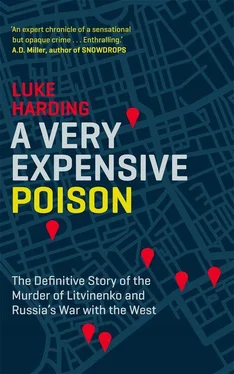Pro-Russian groups set up roadblocks heaped with black tyres. Masked youths, mostly armed with sticks, stopped and checked cars. Closer to Slavyansk the barricades got bigger. The route and main checkpoint led over a bridge. Halfway across was an extraordinary sight: a group of women, mostly elderly, stood in a line holding gold-framed icons, praying and bowing.
It was hard to tell whether the Cossacks were a serious military force or a sort of colourful grenade-wielding theatre troupe, made for Russian TV propaganda. The central government in Kiev responded by dispatching a convoy of six armoured personnel carriers (APCs). It turned up in Kramatorsk, 10 miles (16 km) south of Slavyansk. Other Ukrainian soldiers were holed up in a nearby aerodrome.
A crowd surrounded the column, then armed men in fatigues. Without firing a shot, they persuaded the terrified Ukrainian servicemen to yield their vehicles. The gunmen sat on top of them. Someone raised a Russian tricolour. Around 200 people cheered and took photos. The men drove off. The column rattled past Kramatorsk’s train station and turned right over a steep dusty bridge, belching clouds of diesel smoke.
From close up, it was clear that these rebels were different from the amateur teenage volunteers camping out in Donetsk. They were professionals. They had Kalashnikovs, flak jackets, ammunition. One even carried a green tube-shaped grenade-launcher. Where had they come from? Some hid their faces under black balaclavas. Others waved and smiled. All wore orange and black St George’s ribbons – the symbol of the Soviet victory in the Second World War over Hitler and fascism.
The column disappeared. It was easy to follow. I got into my vehicle and pursued a line of fresh white tread tracks left in the tarmac. The column drove serenely into Slavyansk, past its checkpoints, and parked round the back of the occupied city hall, next to the White Nights café. Locals seemed mystified. ‘I heard the sound of tanks approaching. I thought Ukrainian troops had arrived,’ Vladimir Ivanovich said. So who were the soldiers in masks? ‘I don’t know,’ he told me.
The mysterious armed men stood around in a small municipal park. It was sunny, a perfect spring morning. The captured APCs became the town’s newest, most unexpected tourist attraction. Teenage girls posed with the masked gunmen. Small children lined up for photos as well. The atmosphere was calm, one of military order. The town hall had been meticulously sandbagged. Sniper points had sprung up on the roof.
I asked one of the masked men where his unit had come from.
He said: ‘Crimea.’
Crimea was Ukraine’s Black Sea peninsula, now under new Russian ownership. Vladimir Putin had annexed it the previous month. It had already been home to Russia’s Black Sea fleet and to thousands of Russian military personnel. And it was several hundreds of miles away. It appeared the gunman and his unit had managed to infiltrate across the Russian–Ukrainian border. Now they were in Slavyansk.
How were things back in Crimea?
‘ Zamechatelno ,’ he replied in Russian – terrific, splendid. ‘The old ladies are happy. Because of Russia their pensions have doubled.’
Where was he from originally? Ukraine? Somewhere else?
‘I’m from Russia,’ the soldier said.
Days later, the kidnappings and murders started. Those taken hostage included a group of international observers from the Organisation for Security and Cooperation in Europe; journalists, Ukrainian and western; and others suspected of pro-Kiev views. If Russia was a mafia state, the DNR, it appeared, was a mafia statelet.
A local councillor, Vladimir Rybak, confronted DNR supporters who had taken over the town hall in neighbouring Gorlovka. As he left the square, four men in masks and military fatigues grabbed him and bundled him into a Kia car. Three days later, his battered body was found in Slavyansk next to a river. He’d been tortured. There were stab marks on his stomach and bruising on his chest. His kidnappers had tied a sandbag to his body. While he was unconscious they drowned him.
* * *
The conflict that gripped Ukraine in 2014 wasn’t, as Moscow would claim, a civil war. It was, in reality, a Frankenstein-like conflict, created by the Russian government artificially and given life by the brute external shock of military force and invasion.
Many of the themes that featured in Litvinenko’s murder were here again, played out on a bigger and more terrible canvas. There was the use of violent methods to achieve political goals. As in his previous war in Chechnya, Russia’s president seemed entirely indifferent to the cost in human lives. This was true both of Ukrainian civilians who were the war’s main victims, and of Putin’s own soldiers, whose deaths in conflict he refused to acknowledge.
The Kremlin had lied about Litvinenko’s assassination; now it was lying about its role in a major war in Europe. The Russian military supplied the hardware used by the rebels: tanks, armoured vehicles, artillery pieces. Russian soldiers – sometimes repackaged as ‘volunteers’ – did much of the fighting. When it appeared the rebels were on the brink of defeat, Moscow used its regular units to crush Ukrainian forces.
Without Russia there wouldn’t have been a war in 2014. There would undoubtedly have been tension between the central government in Kiev and its predominantly Russian eastern regions – a political dispute about autonomy, devolved powers, and the status of the Russian language. But Ukraine wouldn’t have fallen apart. Fewer people would have died.
Months earlier, a pro-western revolution had taken place in the capital Kiev. It began as a spontaneous grass-roots movement. It sought to employ democratic methods and peaceful protest. It looked like other global uprisings in New York or Paris or London. There were tent encampments in the centre of Kiev, rallies, speeches and flags. It only turned violent following a brutal government clampdown.
The counter-revolution that took place in eastern Ukraine soon afterwards was different. For sure, it enjoyed some popular support. But this was in essence a top-down army and intelligence operation, coordinated from next door by Russia. It soon morphed into a full-scale covert Russian invasion. The first revolution happened by accident; its antithesis was the result of a carefully curated plan that might have come – and probably did come – from a KGB textbook.
In November 2013, a well-known Kiev journalist, Mustafa Nayem, posted a question on Facebook. Earlier that day, Ukraine’s president Viktor Yanukovych had announced he was dumping his country’s preparations to sign an association agreement with the European Union. The agreement had been long awaited. Instead, Yanukovych said he was turning to Russia. He said Moscow had offered Kiev a $15 billion loan.
Nayem – an investigative reporter born in Afghanistan – wrote on his Facebook page: was anyone planning to go to the Maidan? The Maidan is downtown Kiev’s central square and the scene of Ukraine’s 2004 Orange Revolution. ‘In one hour my post had more than 1,000 “likes”,’ Nayem said. ‘That night 400 people showed up. They stayed until 6 a.m. Most of them were my friends from Facebook. It was the so-called creative class,’ he told me.
The demonstrators understood what Yanukovych’s decision meant: that the president had abandoned the idea of closer integration with the west. Instead, Ukraine would remain part of Russian political and economic space – with key decisions over the country’s future and foreign policy taken, in effect, by the Kremlin. Yanukovych would be Putin’s provincial viceroy. The loan was a bribe.
For the opposition, this vision of Ukraine’s future was unappealing. It came on top of four years of misrule, during which the president, his family and cronies had robbed the state. Corruption was nothing new in Ukraine; the country of 46 million had always had lousy leadership.
Читать дальше












